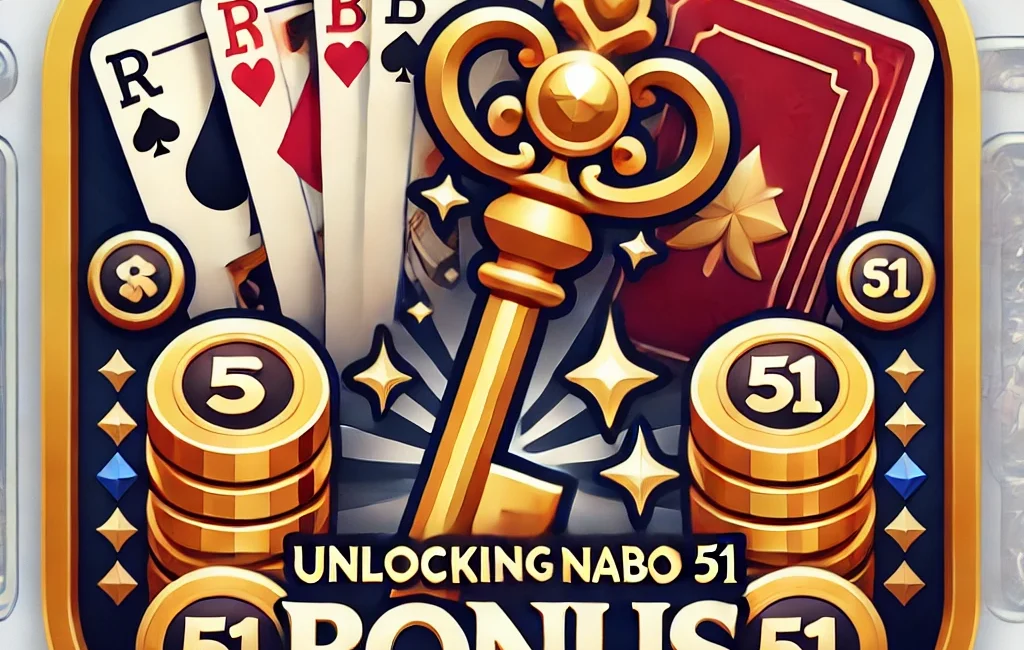
The Rummy Nabob 51 Bonus: rummy culture An All-Inclusive Guide Rummy is a card game that has caught players’ attention all over the world with its unique combination of skill, strategy, and random chance. Classic 777 Slots APK Because of its distinct gameplay mechanics and scoring system, the Rummy Nabob 51 Bonus stands out among the other Rummy formats. The goal of the Rummy Nabob 51 Bonus is to maximize players’ scores by strategically managing 777 slots their hands to form valid sets and sequences. The term “51 Bonus” describes the extra points given to players who successfully meld their cards in a particular manner, usually by combining sets & sequences that add up to 51 points or more.
As the game moves through several rounds, players in this variation are competing not only against one another but also against the clock. Players have the chance to score points in every round, & the 51 Bonus encourages them to consider their card combinations carefully. It is essential for any player who wants to improve their gameplay to comprehend the guidelines pertaining to this bonus. For example, in order to reach or surpass the 51-point threshold, players need to know how many points their cards are worth & how to combine them efficiently. Since each card in Rummy Nabob has a different point value, the scoring system is complex.
Face cards (Kings, Queens, & Jacks) are worth ten points each, while number cards usually retain their face value. Depending on how they are used in a sequence, aces can be worth one point or eleven points. Players must continuously assess their hands & modify their strategies in response to the cards they draw and the moves made by their opponents, which adds depth to the game. It is crucial to take a proactive approach to card management if you want to maximize your hand in Rummy Nabob for the 51 Bonus. Along with creating legitimate sets and sequences, this entails strategically holding onto some cards that could increase in value as the game progresses.
Prioritizing early sequence formation with your high-value cards is one successful tactic. For instance, drawing the Jack of Hearts would enable you to immediately construct a sequence worth 30 points if you had a King of Hearts and a Queen of Hearts. Also, players should be aware that a single hand can be used to create multiple melds.
Making informed decisions about which cards to keep can be achieved by keeping track of which cards have been discarded & which are still in play. For example, if you have multiple cards that could form different sets or sequences, think about which combination would score the most while simultaneously monitoring the possible moves of your opponents. When choosing whether to keep a card that has the potential to finish a sequence or toss it in favor of another option, this insight can be very important. Determining when to split possible melds for a bigger strategic advantage is another part of optimizing your hand.
Holding onto a card that initially appears to be less valuable can occasionally be advantageous later in the game. For instance, it might be wise to hold onto the third card rather than immediately forming a meld if you have two pairs of cards that could form sets and a third card that could complete a sequence with one of your opponents’ cards. In Rummy Nabob, wild cards and jokers are essential for improving your gameplay & raising your chances of hitting the 51 Bonus. These adaptable cards are a great asset to have in your hand because they can be used to form sets or sequences in place of any other card. By strategically using jokers, players can create melds that would otherwise be impossible, drastically changing the game’s dynamics.
Using jokers to finish high-value sets or sequences is one useful tactic. For example, you can use the joker to finish a sequence with adjacent cards or create a set of three 7s if you have two 7s and a joker. Your opponents are kept guessing about your actual hand strength thanks to this flexibility, which also helps you score higher. Also, waiting until the end of the game to use jokers can open up possibilities for unexpected declarations that surprise your opponents.
However, using jokers sparingly is crucial. Even though they can be effective tools for finishing melds, relying too much on them can result in missed chances to form sets or pure sequences without wild cards. Maintaining a strong hand while also leaving their options open for subsequent rounds requires players to strike a balance between using jokers & conventional card combinations. Rummy Nabob relies heavily on the skill of discarding and picking up cards, particularly when trying to reach the 51 Bonus. Your entire plan and possible score may be greatly impacted by every choice you make during this stage.
Players should exercise caution when discarding cards, taking into account both their own requirements and the potential advantages their opponents may gain from their discards. Discarding cards that are unlikely to add to the strength of your current hand is a smart move. For instance, think about throwing away lower-value cards that don’t fit into your plan if you have a number of high-value cards but lack important connectors for sequences. On the other hand, it could be wise to hold onto similar cards that could finish their melds while also thinking about how you can thwart their plans if you observe that your opponent frequently picks up particular card types.
It’s also important to exercise caution when selecting cards from the discard pile. Players should assess how each card fits into their overall strategy, even though it may be tempting to grab any card that looks helpful. A card that could finish your sequence but could also be useful to your opponent later on might be worth taking a chance on, for example, if you see them discarding it.
This decision-making process is essential for keeping a competitive advantage and making sure you are moving closer to earning the 51 Bonus. The main goal of Rummy Nabob is to create legitimate sets and sequences that advance the player toward the coveted 51 Bonus. A sequence is made up of three or more consecutive cards of the same suit, whereas a set is made up of three or four cards of the same rank but different suits.
Maximizing your score requires knowing how to create these combinations efficiently. It is advantageous to start with high-value cards when creating sets. Merging them into sets early on should be your top priority, for instance, if you are holding several Kings or Queens. This saves you points and lessens the quantity of valuable cards you may still hold, which could result in penalties if you can’t declare before someone else does.
Also, take into account the number of sets you can create at once; occasionally, splitting up a single set can result in several smaller sets that add up to more points. Sequences must be carefully considered for appropriateness and order. Pure sequences, or those formed without the use of jokers, are more important when it comes to scoring, so players should try to create them whenever they can. A pure sequence like the 5, 6, and 7 of Spades, for example, not only directly affects your score but also shows strategic foresight in skillfully managing your hand.
Keep reevaluating your options for creating sets and sequences as you draw new cards throughout the game, taking into account what you currently have & what is still available. Keeping an eye on your opponent’s moves is just as crucial in Rummy Nabob as paying attention to your own hand. One can learn a lot about their tactics & possible hands by watching how they play. This awareness enables you to predict the cards’ next moves & make well-informed decisions about which cards to keep or discard. Keeping track of which cards opponents take from the discard pile & which they decide to discard themselves is a useful strategy. An opponent may be attempting to form particular sets or sequences if they routinely pick up particular suits or ranks.
When you spot these trends early on, you can modify your approach by keeping cards that could help them finish their melds or by discarding cards that would help them. Also, observing how rapidly opponents declare can reveal information about their level of confidence in their abilities. Declaring early in a round could indicate that a player has made strong melds quickly; on the other hand, if a player is hesitant or takes longer turns, it could indicate that they are having trouble with their hand. Your own decisions regarding when to declare or hold back can be guided by this information, depending on how competitive the current round seems. In Rummy Nabob, choosing when to declare is crucial & has a big impact on how the game turns out. Waiting too long can result in penalties if another player declares first with a stronger hand, but declaring too early can result in missed opportunities for higher scores if you haven’t yet formed optimal melds.
Declaring when you are certain that your hand meets or surpasses the 51-point requirement while taking prospective future draws into account is a smart practice. It might be prudent to declare sooner rather than later if you have already created a number of high-value sets or sequences & think there is little chance for improvement with more draws. However, if you are still trying to finish important melds or you think your opponents are about to declare themselves, you might have more chances to make strategic plays if you hold back. Since timing is crucial, players should continue to adjust their strategy according to how each round plays out. You may be able to declare before other players do if you observe that they are discarding high-value cards or appear hesitant in their plays.
This is particularly likely if you have solid combinations in your hand already. In Rummy Nabob, winning consistently demands a blend of strategic thinking, flexibility, & astute observational abilities. One good piece of advice is to create a strategy that is adaptable so you can change course when the game conditions change.
This entails having the flexibility to modify your strategies in response to opponents’ unexpected moves or new cards that are drawn. Another crucial component is exercising patience; there are instances when holding off on making a declaration too soon can produce better outcomes. Every time you turn, take a moment to consider not only your own hand but also what other people are doing nearby. This awareness will help you make better decisions in the future.
Also, practicing with practice games can greatly enhance your comprehension of card combinations & tactics unique to the ruleset of Rummy Nabob. Talking with seasoned players can reveal sophisticated strategies that aren’t always obvious from casual play. Last but not least, staying upbeat while playing builds resilience against obstacles, such as unfavorable card draws or fierce competition from knowledgeable opponents. Accepting every round as a chance for improvement will eventually improve performance and enjoyment in this engrossing card game.lottery sambad old
